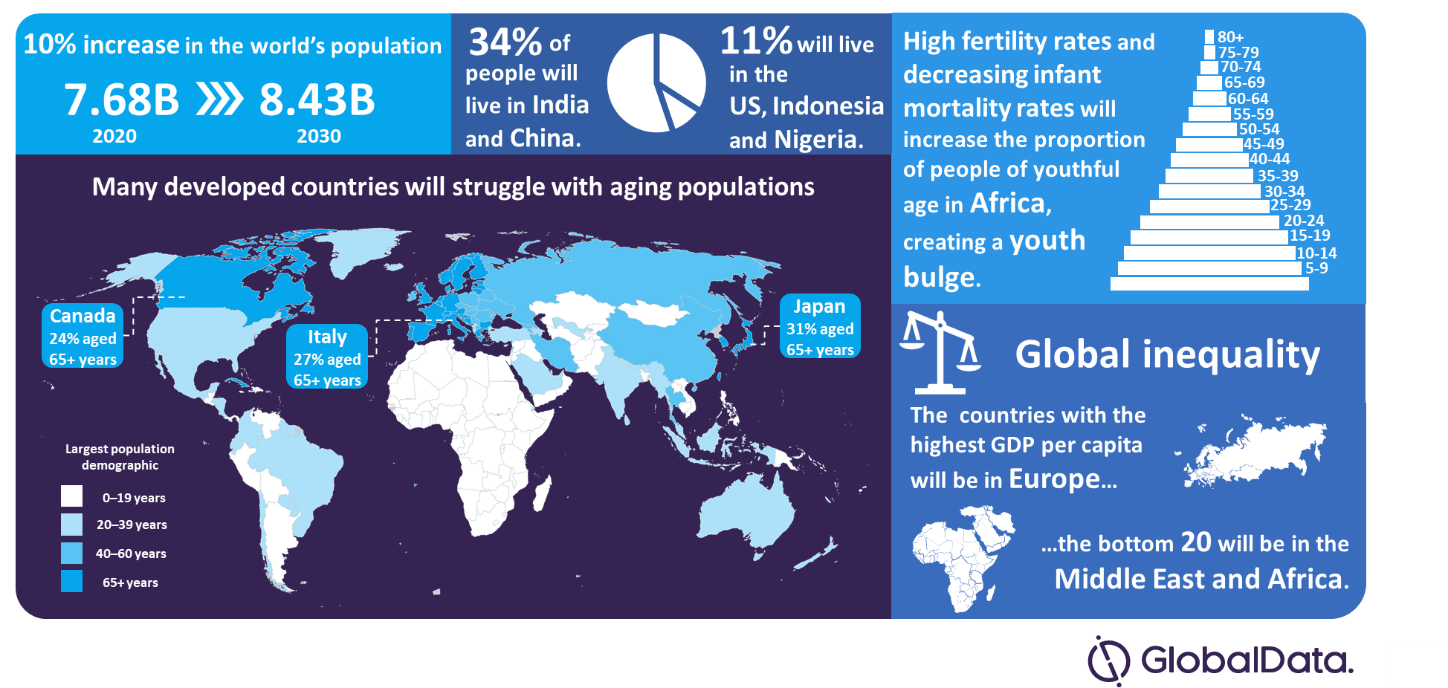The Tech in 2030 – Thematic Intelligence Research Study has been recently added to GlobalData Plc report store. Our analysts have identified several factors such as climate change, demographics, geopolitical factors, and supply chain disruptions that are causing profound shifts in the global economy. The report also includes an assessment on the impact levels of continuously evolving technology on different industry verticals, ranging from education, work, and retail to manufacturing, energy, transport, and others, until 2030.

Download PDF Sample to Get Detailed Impact Analysis of Technology!
Tech in 2030 – Industry Highlights
- Future of Technology in Education: The global edtech market will grow from $226 billion in 2022 to $539 billion in 2030. The market growth will be fueled by increasing student populations and surging connectivity worldwide. Immersive technologies, including gamification, VR & AR, consumer electronics, video-assisted learning, and others will increase learners’ engagement. However, socioeconomic and technological challenges will prevent the complete replacement of traditional education methods.
- Future of Technology in Energy: By 2030, fossil fuel mitigation strategies will be in full swing. The World Bank’s initiative will help in ending routine gas flaring by 2030. In 2030, the demand for natural gas will increase by 13% compared to 2020 levels. Rising investor and consumer pressure will force energy companies to decarbonize, diversifying their energy sources and mitigation technologies.
- Future of Technology in Entertainment: The metaverse will become the bedrock of the new-age video entertainment era. Cloud gaming will be the norm in 2030. Cloud technology will make consuming and producing content more accessible, especially for the gaming industry. Wearable tech will add more realism and immersion to entertainment. Esports will become huge across all geographies by 2030, propelled by advances in technology and consumer demand for gaming content.
Looking for additional insights on the technology usage statistics across any of the above industry segments? Request a Sample PDF right here!
- Future of Technology in Financial Services: Top five predictions for the future of financial services covered in this report revolve around invisible banks, mobile wallets, BNPL, digital currencies, and quantum computing. Banking will predominantly be accessible through digital channels. Open banking will make payments less visible. Mobile wallet transactions are expected to reach $140 trillion by 2030. Big Tech will seamlessly incorporate BNPL into its platforms, moving it away from a fintech market. Countries will develop their own central bank digital currencies (CBDCs). CaixaBank has already used quantum computing to improve its portfolio optimization and investment hedging.
- Future of Technology in Food & Farming: IoT will accelerate precision agriculture. Blockchain will enable farmers to certify their products, connect with the supply chain, and foster fairness in finance. Agri-drones are likely to play a prominent role and become integral to farm operations. In addition, farm operations will no longer require physical proximity, as digital twins enable remote and automated execution, monitoring, and control.
- Future of Technology in Healthcare: Aging populations will result in greater demand for healthcare as the prevalence of age-related diseases such as dementia grows, and the workforce shrinks. Technologies that can ease this burden will be welcomed by healthcare systems, even if prices remain relatively high. Telemedicine, digital therapeutics (DTx), remote patient monitoring (RPM), surgical robots, exoskeletons, personalized medicines, smart pharma, and care robots will become mainstream by 2030.
- Future of Technology in Manufacturing: Industry 4.0 technologies and materials ranging from Industrial IoT, robotics, digital twins, advanced materials, metaverse, AI, cybersecurity, and 3D printing will disrupt the entire manufacturing value chain. By 2030, SynBio will be at the heart of the bioeconomy and will have unlocked a range of new products and concepts through new biological systems or re-designing existing ones for useful purposes.
Get PDF Sample Right Here to Access Detailed Infographics and Descriptive TOC
- Future of Technology in Retail: Traditional shopping centers will use entertainment to increase footfall and time spent in malls. This trend has already hit malls in the US, Canada, Dubai, and Finland and will be worldwide by 2030. In 2030, live app navigation and the metaverse will add to the retail experience. Personalization and convenience are the future of conscious spending. Retailers will adopt advanced payment methods. The retail space will shift to adapt to consumer lifestyle choices. The influence of influencers will be even stronger by 2030. In-store functions and distribution and logistics are the areas of retailing that will undergo the most automation by 2030.
- Future of Technology in Space: It is estimated that the space economy will be a $1 trillion sector by 2040. 2030 will see new players and use cases emerge within the satellite market. Space tourism prices will decrease with launch costs but remain out of reach for most. The next stage of the space economy will be hallmarked by the proliferation of space-based infrastructure such as space stations. These space stations will have a variety of use cases, including serving as hotels, laboratories, microgravity factories, and national outposts.
- Future of Technology in Transport: Smart city technologies will see even wider adoption and connection. Micro-mobility and last-mile solutions will be ubiquitous. Electric vehicles (EVs) will become increasingly prevalent, but the required infrastructure must be set up in preparation. Autonomous vehicles (AVs) will be more available by 2030 in the form of robotaxis, buses, and heavy goods vehicles. Flying taxis and urban air mobility will have their first scalable operations by 2030.
- Future of Technology in Work: The four-day work week will be widespread in 2030. The transition will be led by companies rather than governments. Technology will displace certain tasks, and support many more, but will not be capable of replacing humans by 2030. Big Tech companies such as Microsoft, Nvidia, and Meta, and start-ups like Varjo, Virbela, and Spatial, view the metaverse as the next stage of workplace collaboration. Meanwhile, digital twins will be used to replicate physical spaces, such as factories.
View Report Sample for Better Understanding of Each Growth-Contributing Factor
Key Tech in 2030 – Thematic Intelligence Highlights
- The global outlook for 2030 in terms of demographic trends, including future population growth and GDP forecasts.
- The outlook for climate change, highlighting the impacts and the cost of climate change.
- Forecasted price changes in metaverse-enabling consumer electronics including AR and VR devices.
- Forecasted energy consumption growth rate against GDP per capita by country.
- Energy generation growth rates by region.
- The impact of Web3 on the future of cloud gaming and the future winners in the industry.
- The future of central bank digital currencies.
- Analysis of the future alternative proteins market.
- Predictions and market forecasts for personalized medicine.
- The role of synthetic biology (SynBio) in manufacturing value chains.
- Influencer impact on retail.
- Timeline for the future of space infrastructure.
- Forecasts and expectations for urban air mobility and flying taxis.
- The role of inflation and regulation in the evolution of the gig economy.
For more highlights on the impact of Technology in different segments, Download Sample Now
Related Reports:
About GlobalData
GlobalData is a leading provider of data, analytics, and insights on the world’s largest industries. As a leading information services company, thousands of clients rely on GlobalData for trusted, timely, and actionable intelligence. Our mission is to help our clientele ranging from professionals within corporations, financial institutions, professional services, and government agencies to decode the future and profit from faster, more informed decisions. Continuously enriching 50+ terabytes of unique data and leveraging the collective expertise of over 2,000 in-house industry analysts, data scientists, and journalists, as well as a global community of industry professionals, we aim to provide decision-makers with timely, actionable insights.
Media Contacts:
Mark Jephcott
Head of PR EMEA
mark.jephcott@globaldata.com
cc: pr@globaldata.com
+44 (0)207 936 6400

